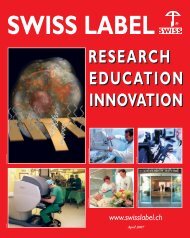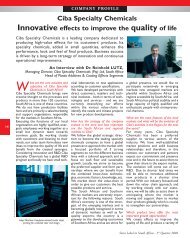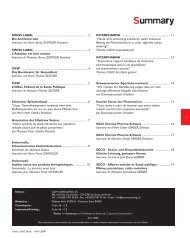SWISS LABEL INFORMATIQUE-XP - Com Consulting SA
SWISS LABEL INFORMATIQUE-XP - Com Consulting SA
SWISS LABEL INFORMATIQUE-XP - Com Consulting SA
You also want an ePaper? Increase the reach of your titles
YUMPU automatically turns print PDFs into web optimized ePapers that Google loves.
C O M PA N Y P RO F I L EInstitute of BiotechnologyFruitful collaboration with Lausanne University Hospital CHUVThe Institute of Biotechnology, which is attached to the Faculty of Biology and Medicine at the University of Lausanne, isbased at the same centre as the Laboratory of Cellular Biotechnology of the Swiss Institute of Technology (EPFL). Headedby Professor Nicolas Mermod, the institute comprises researchers and teaching staff who specialize in genetic engineeringand molecular biotechnology. Many of its research projects are carried out in close collaboration with the CHUV.Collaboration with the CHUV involvesresearch projects that seek to find newclinical or diagnostic applications thatcan offer a new approach to treatment forpatients. One aspect involves the development ofDNA chips that could be used to measure theactivity of certain proteins in tumours. Research isalso carried out into the production of proteinsas drugs. Finally, detection systems are beingdeveloped to measure the effectiveness oftreatments for muscular diseases by gene therapy,in collaboration with researchers at EPFL.Many laboratories all over the world are working on DNA chips, butthe Institute’s project is highly original as it studies the interactionbetween proteins and genes directly.The principle consists of analysing biopsies of tumours in the laboratoryin order to detect protein activity directly. With these chips the Institutehopes to active at a better diagnosis of the tumour, especially for breastcancer, where decisions on the best treatment are still difficult.THERAPEUTIC PROTEIN<strong>SA</strong>nother facet of the Institute's work concerns the production ofproteins as drugs, so-called therapeutic proteins. Currently, drugs suchas insulin or growth factors are extremely costly and difficult toproduce. What’s more, the generic products that appear when a patentruns out often remain expensive. There is therefore a real need to finda way of producing good quality proteins at low cost.While working on this, the laboratory has discovered DNA sequenceswith the potential to increase the production of therapeutic proteinsthrough cell culture, thereby greatly reducing the cost of production.This technology has led to the creation of Selexis <strong>SA</strong>, a spin-offcompany from the University of Lausanne, which has developed intoa truly international biotech SME with contacts all over the world. Itsrole is to make the cells that produce the drugs for pharmaceuticalcompanies.Apart from collaborative projects with the CHUV, the main focus ofthe laboratory’s research is on understanding how genes are switchedon and off in the cells of mammals, including in human cells. Thisresearch has made it possible to identify certain genetic isolators that canbe used in gene therapy. These isolators are small pieces of DNA thatwill help keep the therapeutic gene active in the patient’s cell whenrequired, without interfering with any other genes and above allwithout any undesirable side effects.© Institut de BiotechnologieThe Institute is conducting this research as part ofthe European network of excellence in gene therapy,in which researchers are developing new and safervectors for this type of therapy. The network consistsof a large consortium of around twenty researchlaboratories and pharmaceutical companies in Europeand the United States, of which the Institute ofBiotechnology is the only Swiss member.NUMEROUS COLLABORATIONSThe contribution of the Institute of Biotechnology tothe European Network of Excellence in GeneTherapy is to develop these genetic isolators. These elements are thensent to partners in Germany who check that the gene therapy vectorsfunction correctly and have no toxic effects on the cells or animals.The initial therapeutic tests are carried out on animal models ofhuman diseases before partners in France embark on clinical trials inpatients, especially for the treatment of certain types of cancer.Because biotechnology can merge and assemble the results of basicresearch from a wide variety of sources, the laboratory has naturallyinitiated a very large number of collaborative projects. In this way it getsthe computing power required for the research through cooperationwith researchers at the Swiss Institute of Bioinformatics based inGeneva, Lausanne and Basel, who are pioneers in this field. Othercollaborations conducted at the interface of physics at EPFL, withbiology at UNIL, and with the clinical world at CHUV illustrate thetype of synergies that are made possible through the proximity of theseacademic institutions to the university hospitals.EPFL - LBTMCH B1 391 - Station 6 - CH-1015 LausanneTel.: +41 (0)21 693 76 16 - Fax: +41 (0)21 693 76 10Website: www.unil.ch/biotech55Swiss Label CHUV 2010














